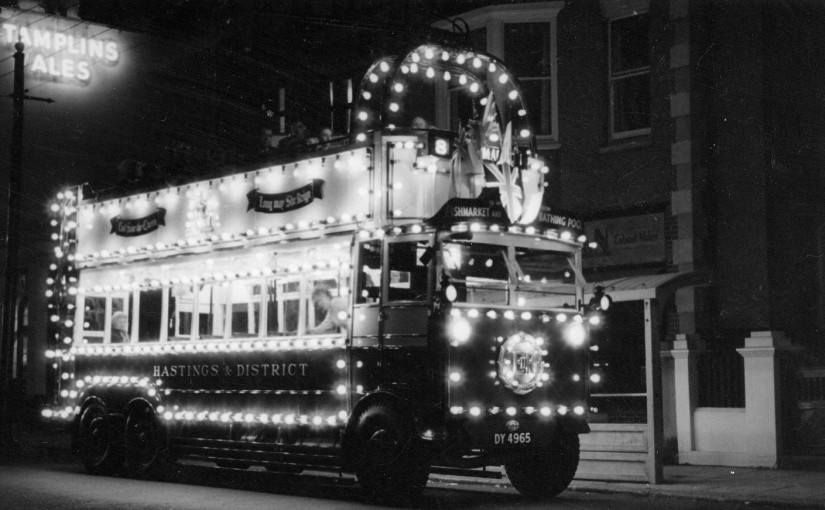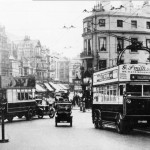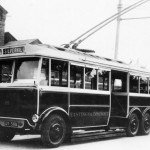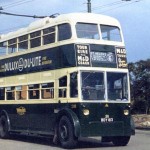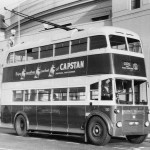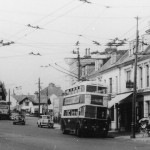The Story of the Trolley Bus
By Roland Jempson
On April 1st 1928 Hastings experienced a new type of public transport. The opening of the towns new Trolleybus system, it was inaugurated by four of the newly delivered GUY BTX 60 Trolleybuses Nos 1, 2, 3 and 4 with Christopher Dodson open top bodies, on the No 4 route, Hollinton to the Fish Market via Bohemia Road and The Memorial, replacing the Trams on the part of the route to the Memorial (Trams did not operate to the Fish Market or Old Town). One of the Trolleybuses was even driven by Mr Vincent Edwards the Manager, The First four were decorated with Flags and Bunting, and had as passengers invited guests and Ex Servicemen.
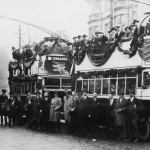
The other four open top trolleybuses, Nos 5 to 8 soon joined them to operate an 8 minute frequency for the rest of the day, and the following days, on the 21st of May the London Road, Sea Front, Memorial route was completed for trolleybus operation, using by now the newly delivered Single deckers, GUY BTX 60s with Ransomes 32 seat central entrances (Nos 9 to 58, these were delivered in the rest of 1928 to 1929). The following sections of Tramway were converted on the 30th of July, The Memorial to a new turning circle at Alexandra Park (Junction of St Helens Road and Park Cross Roads) The bottom of London Road to West Marina (Turning circle at the Bo – Peep Hotel), this was extended to Bexhill & Cooden on 18th September, Bulverhythe Depot supplied the trolleybuses for this route, 1929 saw the end of the Trams when the rest of the system was completed including the Mount Pleasant, Ore, St Helens, section on the 24th January, and on the 4th March new wiring along High Street to the top to connect to Clive Vale and Ore as well as Old London Road. At first a “One Way System” operated along the High Street (Up in the mornings, down in the afternoons!
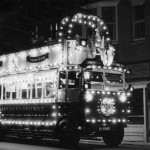
The remaining section, St Helens to Silverhill for the Circular via Baldslow was Completed on the 15th of May 1929 when the last Tram Ran!
In 1930 – 31 new sections were authorised, they were from the Langham Hotel via a shorter route to Alexandra Park Main Gates down Elphinstone Road as an alternative to the longer route via Laton Road, used by the Trams as Elphinstone Road was too steep for them, this also meant that Trolleybuses had a compulsory stop at the top of the hill, and had to engage the “Coasting brake” Before
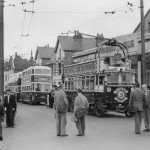
Descending, this was completed on the 10th of August, the others were the Hastings Station Loop, which was “One Way via Cambridge and Havelock Road, also the direct route through Bexhill via Cambridge Gardens and Havelock Road, also the direct route through Bexhill was completed via Western Road. Other extensions were sanctioned but never were used. They were for the rest of Hughenden Road, and a short section from Cambridge Road to the Sea Front at the White Rock Pavilion, this was to be for Trolleybuses to use to wait for late night patrons leaving Theatre. No other extensions were made until 1947 when a new turning was created at Hollinton 300 yards further up Battle Road, to replace the reverser at the Victoria Inn/ Glen Road as this had become dangerous for the Trolleybuses to reverse, also a new turning circle was constructed at the Bull Inn Bexhill Road.
By 1932 the following routes were operated.
1 – Circular – Silverhill – London Road – Memorial – Old London Road – Ore – St Helens – Baldslow – Silverhill
2 – Circular (Opposite way round)
3 – Hollington – Alexandra Park via London Road – Sea Front – Memorial
4 – Hollington – Fishmarket via Bohemia Road – Memorial
5 – Ore – Bexhill – Cooden via Mt Pleasant Memorial – Bathing Pool
6 – Langham – West Marina via Memorial Sea Front
7 – St Helens – Bexhill via Ore – Mount Pleasant – Memorial – Bathing Pool
8 – Silverhill – West Marina via London Road – Sea Front (Summer Only)
9 – Hastings Station – Ore via Fish Market – Clive Vale
10 – Hastings Station – Ore via Fish Market – Old London Road
11 – Hollington – Ore via London Road – Sea Front – Memorial – Clive Vale
12 – Hollington – Langham via London Road – Memorial – Queens Road – Laton Road
On the 11th of November 1935 Maidstone and District bought out the Hastings Tramways Company, and ran it as a subsidiary company with the result that they co – ordinated the routes with theirs for a more simplified structure. This is the position in 1940
2 – Circular in both directions Silverhill – Memorial – St Helens – Silverhill
3 – Silverhill – Ore via London Road – Mt Pleasant (Come to St Helens)
5 – Alexandra Park – Bexhill – Cooden via Memorial – Sea Front – Bathing Pool
6 – Hollington – Ore via Bohemia Road – Memorial – Mount Pleasant
9 – Hollington – Ore via Bohemia Road – Memorial – Clive Vale (Some St Helens)
10 – Hastings Station – Ore via Memorial – Old London Road
11 – Silverhill – Ore via London Road – Memorial – Clive Vale
12 – Hollington – Langham via Bohemia Road – Queens Road – Laton Road
Routes (10) and (12) only lasted a few months before being withdrawn the (2) was re routed via Bohemia Road instead of London Road in 1942 from 1946 only routes (2) (5) (6) and (11) were operated with alternate journeys on the (6) and (11) being extended to and from Hollington and St Helens. Also from 1950 the (5) was re numbered (8) to avoid confusion with Maidstone and Districts (5) to Maidstone and Gillingham.
In 1939 Maidstone and District placed an order for 48 new closed top double deckers to replace the ageing GUY’s all of the open top GUY’s were withdrawn, (with the exception of No 3 which became retained as an overhead wiring maintenance vehicle), along with some of the Single deckers were sold to other operators, to help them out with vehicle shortages. To replace these came 20 new AEC 661 Ts, 10 with Weymann 54 seat bodies (Nos 1 – 10, BDY 776 – 785) and 10 with Park Royal 54 seat identical bodies (Nos 11 -20, BDY 786 – 795), the war delayed the rest of the order until after in 1946. I used to go to school in the Old Town on the No 9s from Hollington on the AECs they were luxury after the GUYs which had leaky roofs when it rained heavily.
In 1946 to 1948 came the rest of the order for 48 trolleybuses, except only 45 came, the last 3 were cancelled and their registrations (BDY 821-3) were given to the ERF Lorries of Johnny Carter a local haulage Contractor. The first were in 1946 and were Sunbeam Ws with Park Royal semi – Utility 56 seat bodies with BTH motors (The AECs had English Electric motors) they were numbered 21 – 30 (BDY 796-805). The 1947-8 deliveries were again Sunbeams but with 56 seat Weymann bodies similar to the AECs they were Nos 31-45 (BDY 806-820).
One other trolleybus to enter public service was No 3a (DY 4965) which was the former Open top GUY BTX 60 that was not withdrawn in 1940 it became the famous “Happy Harold”, in 1953 it was renovated and fitted with coloured lights for the Queens Coronation adorned with flags, later next year these were replaced with the “Happy Harold” Figure.
The end was in sight when Maidstone and District wound up the Hastings Tramways Company as a subsidiary company on the 1st of October 1957 to merge it with there own operations, the next day the Trolleybuses came out of Silverhill Depot with the Maidstone and District fleet name.
There then followed the legal process to replace the Trolley buses with the modern Leyland Atlantean diesel engined motor buses.
There were many objections from the public and a “Save Our Trolleys” Campaign was started but to no arrival, and the last Trolleybus entered Silverhill Depot from public service on 31st May 1959, with a ceremonial last run the next day 1st June 1959 to and from Bexhill, with “Happy Harold” 3a leading and Sunbeam 34 and A Leyland Atlantean following.
So ended an era of Electric traction in the town that lasted 54 years from the first Trams in 1905.
All the AECs were scrapped but all the Sunbeams went to other operators including Maidstone Corporation Brandford Cooperation and Wallsall Corporation. Besides “Happy Harold” two others survive, namely Sunbeam 34 which is at Carlton Colville still being restored and Guy 45 also still being restored at Northampton, also another Guy Single Decker was found in Essex. A few years ago as a caravan this is also being restored somewhere in the north of the country.
“Hastings Town” June 2008
All articles, photographs, films and drawings on this web site are World Copyright Protected. No reproduction for publication without prior arrangement. (Hard Copy Back Numbers Still Available) © World Copyright 2015 Cinque Ports Magazines Rye Ltd., Guinea Hall Lodge Sellindge TN25 6EG
